As 2018 draws to a close, it is worth recalling a few noteworthy events in the Egyptian world of music. It is impossible to do justice to a whole year’s achievements or capture all its losses, but a number of facts in this article should shed light on general developments and point up a few successes. Omissions are necessary, but they must not undermine my deep appreciation and gratitude for the dynamism of musicians and art managers on the local and international scenes.
In mid-January, the musician Ines Abdel-Dayem, chairwoman of the Cairo Opera House since 2012, was appointed minister of culture. Her new post did not sever her connection with the Opera, however. According to the musicians, she still pays a lot of attention to activities at her previous home.
One of Abdel-Dayem’s first ministerial decrees was the appointment of a new chairman, Magdi Saber, a graduate of the Higher Institute of Ballet in Cairo with a long career as a lead dancer, then as assistant director and choreographer on several ballets. Prior to his new appointment, Saber had served as the head of the Artistic House at the Cairo Opera. In July, conductor and trumpeter Magdy Boghdady was appointed the new head of the Artistic House.

Upon her appointment the new Culture minister Ines Abdel-Dayem [L] honours her predecessor Helmy El-Namnam [R] (Photo: Al Ahram)
But it might not be a bad idea to depart from the Opera just this once, to make room for the numerous initiatives and accomplishments of musicians outside the Opera House motored by the independent sector. First, there was the Manial Palace Festival: Reviving Heritage through Music. The festival which took place between 1 and 9 November filled the Manial Palace’s Golden Hall with the crème-de-la-crème of artists and audiences alike. A first of its kind in Egypt, the festival featured renowned Egyptian musicians whose careers have flourished internationally in addition to a number of international artists.
The Egyptian names included Fatma Said, a young Egyptian soprano who over the past few years has taken the international scene by storm (accompanied by the German conductor and pianist Marcus Merkel during the evening); the Austrian-Egyptian violinist Nadine Weber (accompanied by pianist David Helsz); the German-based Egyptian mezzo soprano Gala El-Hadidi (accompanied by Armenian-French conductor and pianist Vahan Mardirossian) and the Paris-based Egyptian pianist Ramzi Yassa. With a total of eight concerts, the programme also included the Egyptian Chamber Orchestra performing with an Italian violin soloist and conductor Luca Marziale.
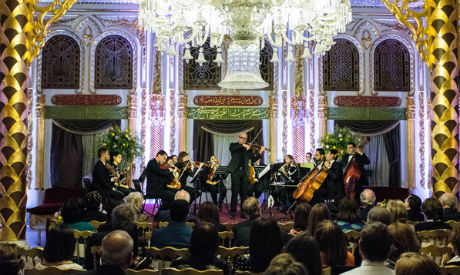
Manial Palace Festival: Reviving Heritage through Music (Photo: Ahmed Hassan)
Launched by the Friends of the Manial Palace Museum (FMPM) — spearheaded by the opera singer Hassan Kamy (who sadly passed away only a month after the festival, on 14 December), and organised with support of Orient Productions, a company founded and managed by Ahmed El-Attar — the festival highlighted two important historical events: the 149th anniversary of the opening of the Khedivial Opera House (the old opera house which opened on 1 November 1869 and burned down on 28 October 1971) and the 143rd anniversary of the birth of Prince Mohamed Ali Tawfik (9 November 1875-18 March 1955).
Even though the participating musicians had already graced Cairo’s stages, including the Manial Palace Hall, this was the first time the audience had such a unique opportunity, during one festival, to savour so many Egyptian talents accomplished internationally.
Speaking of home-grown talents, indeed, let us recall one particular name who, though he did not participate in this round of the Manial Festival, surprises us with new achievements every year: tenor Ragaa Eldin. With a plethora of operas and gala concerts held all across Europe, one of the Ragaa Eldin’s most recent achievements is the tenor of the year prize offered by the Puccini Academy and Amici del Festival Pucciniano. “If you dream it you can make it!” Ragaa Eldin posted on his social media in early December, announcing the big news.
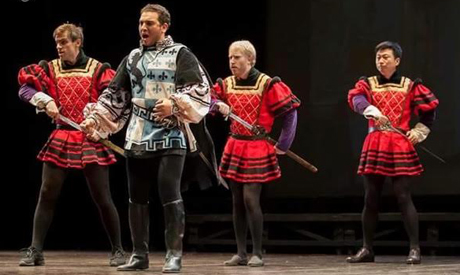
Ragaa Eldin (centre) as Manrico in Teatro Mancinelli's production of Il Trovatore (Photo: courtesy of Ragaa Eldin)
In this context Hisham Gabr and Rageh Daoud should also be mentioned. In May this year, the conductor and composer Hisham Gabr was named Knight of the Order of Arts and Culture (Chevalier de l’ordre des Arts et des Lettres) in France. Established in 1957 by the French Ministry of Culture, the honour is awarded to French nationals and international figures for remarkable achievements in the field of arts and literature. Other Egyptians who received this award include Naguib Mahfouz, Gamal Al-Ghitani, Inji Aflatoun, Alaa Al-Aswany and more recently Ahmed El-Attar.
The composer Rageh Daoud added to his considerable list of achievements when he was honoured in Mauritania by the Mauritanian President Mohamed Ould Abdel-Aziz for composing a new national anthem.
This brings us to Hisham Nazih, one of the most prominent Egyptian composers whose music had been featured in over 35 film and television productions. Nazih was honoured during the 40th Cairo International film Festival (21-29 November), a rather rare event for a musician and his work.
While we’re still on classical music, however, it is important to underline one new initiative: the American University in Cairo (AUC) Opera Ensemble. With artistic direction and coaching by soprano Dina Iskander, an adjunct professor at AUC, the inaugural concert of the ensemble took place on 9 December. Created with the aim of educating the students as well as the audience in the art of opera and Western classical music, the ensemble provides an opportunity for students to perform duets, trios and quintets from different operas.
The new formation also has plans for a larger number of singers from both within and outside AUC, a fact that will allow greater flexibility in the choice of works and might lead to staging fully-fledged operas as well. For now the AUC Opera Ensemble plans biannual performances on the AUC premises, but already they are looking for possibilities across the city.

The AUC Opera Ensemble (Photo: courtesy of the Ensemble)
Another new initiative comes with the Mosaic quintet, a formation whose inaugural concert took place on 1 October at the Malak Gabr Theatre, AUC, featuring works by Sayed Darwish, Riad Al-Sonbati, Tomaso Albinoni and the Rahbani Brothers, among others. Founded and directed by French horn player Amr Abulnaga, the group’s line-up includes a unique combination of musicians specialising in Arabic and/or Western classical music, current or former members of Egypt’s state orchestras and/or other formations.
As Abulnaga explained in an interview I published on these pages, the Mosaic ensemble’s aim is to break the borders separating Western classical and Middle Eastern music, through a creative merging of the French horn with the qanoun or oud (Alaa Saber), supported by piano (Mahmoud Mekhemar), double bass (Ahmed Osman) and percussion (Hisham Kamal).
Another new formation is Sout Beik, a trio featuring Amr Galal (drummer, composer and music producer), Heba Suleiman (music arrangement, composer), and Joe Ghaffar (composer, vocals and lyricist). Sout Beik released their first original song, The Mask, on the music website Anghami in March. Fusing oriental with contemporary sounds, the song is strongly influenced by pop and electronic music, while the group’s original outfits add visual strength to the video clip.
Another new project is Sufism vs Modernism, a series of concerts launched by the Grammy Award-winner Fathy Salama working with the Sufi singer Mahmoud El-Tohamy. The project which saw the light in February merges Sufi poetry and music with Western tunes and electronic sounds.
In March, Egypt’s award-winning Cairo Celebration Choir (CCC) launched the “World Music Concert” series with their concert alongside the Dozan wa Awtar choir from Jordan. The evening included popular compositions and folk songs from the Egyptian and Jordanian repertoire. The series was repeated in May when CCC performed with the world-renowned Egyptian-Scottish duo the Ayoub Sisters at the Marquee Theatre.
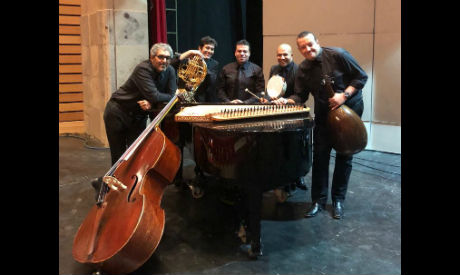
Mosaic quintet (Photo: courtesy of Mosaic quintet)
The scene also witnessed a few important musical revivals. After over 20 years of absence from stage, in September, the band Edward and the Gypsies announced their return to Egypt and Dubai’s stages at the beginning of 2019. Established by Edward Fouad, the group gained unprecedented popularity in the 1990s with the song Laylo Laylo becoming their iconic hit. With the passage of time, the ensemble started playing less frequently, while Fouad started a career in film. Edward and the Gypsies will bring back Edward Fouad, Ahmed Adel, Wael Kheidr, Mohamed Sabah together with a few new members.
Past fires were also rekindled with Zaii Zaman, an ensemble founded by violinist Ahmed Hassan in the 2000s with the aim of reviving the beauty of Arabic instrumental music. Zaii Zaman had given fewer and fewer concerts until they stopped altogether in 2016. But in 2018 a few performances here and there saw Zaii Zaman as quartet, quintet or sextet, with a line-up featuring Hassan on violin, Mahmoud Bedair on cello, Samer Barakat or Sherif Barakat on qanoun, Ahmed Ewais or Salah Ragab on double bass, Hani Al-Badri on ney, Hany Bedair on riq and Amr Mustafa on percussion.
In September, Zaii Zaman participated in the first Maqom Art International Forum in Shakhrisabz, Uzbekistan, as a quartet. They also released a music video created for the grand celebration of Mahatma Gandhi’s 150th anniversary, a project in which they were joined by singer Reem Ezzeddin.
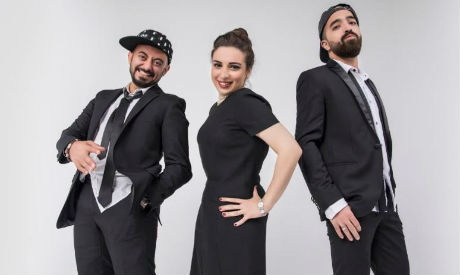
Sout Beik trio. From L to R: Amr Galal, Heba Suleiman and Joe Ghaffar (Photo by B2E Entertainment)
As November dawned, Massar Egbari, one of Egypt’s most popular bands which since 2005 has been mixing Oriental sounds with rock, blues and jazz, released their album, El-Album, three years after their latest, Tou’aa w Te’oum. It features collaborations with many other well-known artists such as MTM, Sary Hany, Mohamed Sakr, Amir Hedayah, Shergo Mikawi, Hesham Galal and Ahmed Saleh.
Around the same time, another trio — Maryam Saleh, Maurice Louca and Tamer Abu Ghazaleh — brought home an important award. Their album Lekhfa (2017) won them the Best Artist, Duo or Group in African Rock by AFRIMA’s fifth edition in Accre, Ghana (November 2018). Shortly afterwards, the experimental musician Maurice Louca announced the release of his new album titled Elephantine on 1 February 2019. Louca describes it as his “most ambitious project yet”.
And while one of Egypt’s most popular saxophone players Nour Ashour was working on his first album with his formation Nour Project, in June he released a new single, Sinai, paying tribute to Egypt’s “gorgeous land overlooking us from heaven, where the sun shines its light on us”, as the lyrics say.
Along the same lines, six years after his last album (Ahl El-Arab Wel-Tarab, 2012), Mohamed Mounir, the Nubian singer dubbed The King announced in early December that he would release a new album “soon”. Called Watan (Homeland), the album will be exclusively available on a mobile operator’s platform for pre-release on-demand listening.
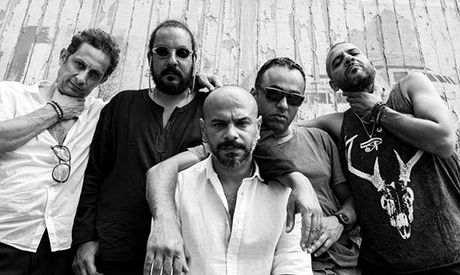
Massar Egbari
Another important achievement concerns the musicians Dina El Wedidi, Youssra El Hawary and Mohamed Abozekry and Karkadé who had an extensive US tour in September and October, part of the Center Stage initiative that aims “to bring artists from abroad to American communities”, as the project’s promotional material says. This is one of many international appearances of the Egyptian musicians.
Locally the scene remains alive, a fact which is topped with the studio Vibe for Developing Arts adding to its regular activities of rehearsal and recording services numerous concerts held by independent groups.
The music scene also witnessed a few unfortunate losses. Fans have to say good-bye to El-Genaina theatre’s concerts as managed by El-Genaina Company. Situated in Cairo’s Al-Azhar Park, this open-air theatre which seats around 500 people was for almost one decade and until November 2014, partially managed by the Cultural Resource (Al Mawred Al Thaqafy), giving the stage to many renowned regional musicians and launching the careers of many local ones.
When the Cultural Resource relocated its headquarters to Beirut, the management of El-Genaina theatre’s stage went to the then established El-Genaina company. Circumstances have since led to a decline in the theatre’s activities and often repetitive events. In November, the company announced its closure leaving the theatre with Al-Azhar Park and the Aga Khan Foundation, who have yet to announce the stage’s future.
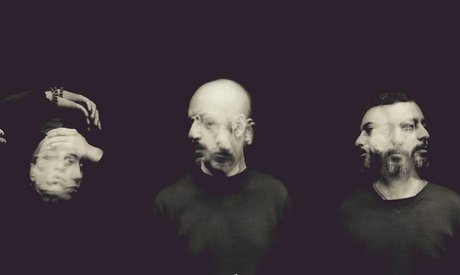
Lekhfa album cover (Photo: part of promotional material)
Even bigger losses came with the departure of Egyptian musicians. 2018 opened with the death of the guitarist Marwan Shaaban who on 22 January succumbed to leukemia at the age of 38. Shaaban’s most significant contribution to music was through playing in Wyvern, a heavy metal band founded in 2003.
The composer and violinist Michel El-Masry passed away on 30 June (aged 85). El-Masry shared the stage with Um Kolthoum in her last few concerts, and composed the soundtracks for over 10 films and 27 television series.
Saleh Abdelaziz, known by his stage name Saleh El-Artist, passed away on 23 July. Considered one of the best accordion players in the Arab world, El-Artist’s repertoire includes countless performances during his more than 20 years of activity. He performed alongside Fathy Salama, participating in his Grammy award-winning album Egypt (2004), and was among the most essential members of Salama’s ensemble Sharkiat.
On 14 December, Egyptian tenor, actor, culture figure Hassan Kami passed away leaving a huge void in Egypt's opera and cultural scene.

Hassan Kami (Photo: Hassan Kami's Facebook)
* A version of this article appears in print in the 20 December 2018 edition of Al-Ahram Weekly under the headline: Viva la independencia
For more arts and culture news and updates, follow Ahram Online Arts and Culture on Twitter at @AhramOnlineArts and on Facebook at Ahram Online: Arts & Culture
Short link: